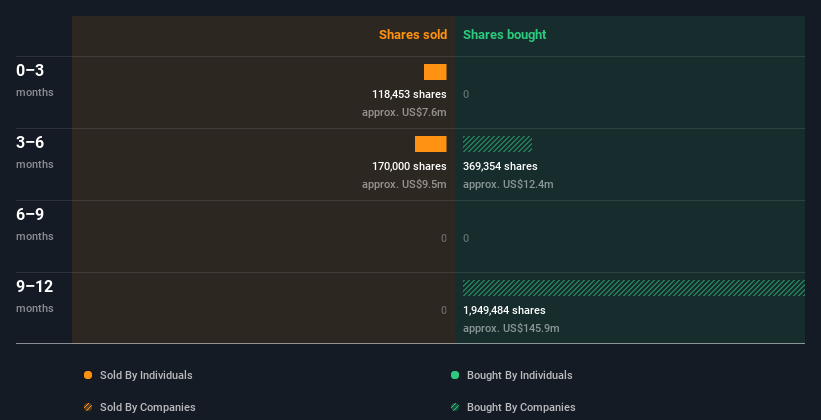- United States
- /
- Software
- /
- NasdaqGS:GTLB
GitLab Inc. (NASDAQ:GTLB) insiders who sold US$18m worth of stock earlier this year are probably glad they did so as market cap slides to US$7.1b
Insiders seem to have made the most of their holdings by selling US$18m worth of GitLab Inc. (NASDAQ:GTLB) stock at an average sell price of US$60.99 during the past year. After the stock price dropped 16% last week, the company's market value declined by US$1.4b, but insiders were able to mitigate their losses.
Although we don't think shareholders should simply follow insider transactions, we would consider it foolish to ignore insider transactions altogether.
Check out the opportunities and risks within the US Software industry.
GitLab Insider Transactions Over The Last Year
In the last twelve months, the biggest single sale by an insider was when the insider, David Hornik, sold US$6.6m worth of shares at a price of US$67.96 per share. While insider selling is a negative, to us, it is more negative if the shares are sold at a lower price. It's of some comfort that this sale was conducted at a price well above the current share price, which is US$47.60. So it may not shed much light on insider confidence at current levels.
In the last year GitLab insiders didn't buy any company stock. The chart below shows insider transactions (by companies and individuals) over the last year. By clicking on the graph below, you can see the precise details of each insider transaction!

If you like to buy stocks that insiders are buying, rather than selling, then you might just love this free list of companies. (Hint: insiders have been buying them).
Insiders At GitLab Have Sold Stock Recently
The last quarter saw substantial insider selling of GitLab shares. In total, insiders dumped US$7.8m worth of shares in that time, and we didn't record any purchases whatsoever. Overall this makes us a bit cautious, but it's not the be all and end all.
Insider Ownership Of GitLab
Another way to test the alignment between the leaders of a company and other shareholders is to look at how many shares they own. Usually, the higher the insider ownership, the more likely it is that insiders will be incentivised to build the company for the long term. GitLab insiders own about US$1.2b worth of shares (which is 17% of the company). Most shareholders would be happy to see this sort of insider ownership, since it suggests that management incentives are well aligned with other shareholders.
What Might The Insider Transactions At GitLab Tell Us?
Insiders haven't bought GitLab stock in the last three months, but there was some selling. Looking to the last twelve months, our data doesn't show any insider buying. It is good to see high insider ownership, but the insider selling leaves us cautious. While we like knowing what's going on with the insider's ownership and transactions, we make sure to also consider what risks are facing a stock before making any investment decision. To help with this, we've discovered 3 warning signs (1 shouldn't be ignored!) that you ought to be aware of before buying any shares in GitLab.
Of course, you might find a fantastic investment by looking elsewhere. So take a peek at this free list of interesting companies.
For the purposes of this article, insiders are those individuals who report their transactions to the relevant regulatory body. We currently account for open market transactions and private dispositions, but not derivative transactions.
New: Manage All Your Stock Portfolios in One Place
We've created the ultimate portfolio companion for stock investors, and it's free.
• Connect an unlimited number of Portfolios and see your total in one currency
• Be alerted to new Warning Signs or Risks via email or mobile
• Track the Fair Value of your stocks
Have feedback on this article? Concerned about the content? Get in touch with us directly. Alternatively, email editorial-team (at) simplywallst.com.
This article by Simply Wall St is general in nature. We provide commentary based on historical data and analyst forecasts only using an unbiased methodology and our articles are not intended to be financial advice. It does not constitute a recommendation to buy or sell any stock, and does not take account of your objectives, or your financial situation. We aim to bring you long-term focused analysis driven by fundamental data. Note that our analysis may not factor in the latest price-sensitive company announcements or qualitative material. Simply Wall St has no position in any stocks mentioned.
About NasdaqGS:GTLB
GitLab
Develops software for the software development lifecycle in the United States, Europe, and the Asia Pacific.
Flawless balance sheet and good value.
Similar Companies
Market Insights
Community Narratives




